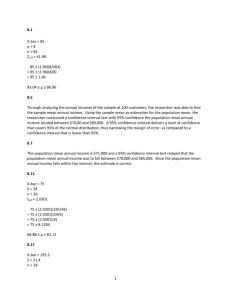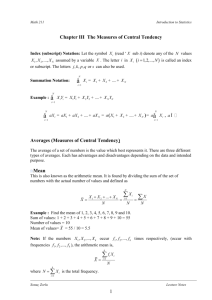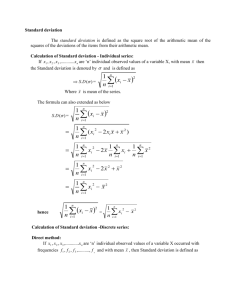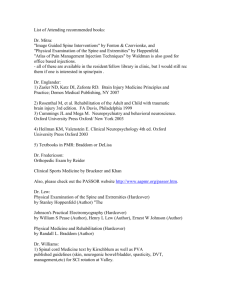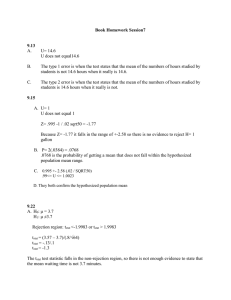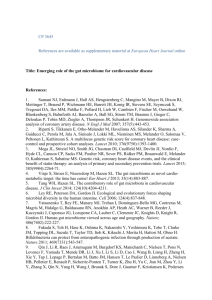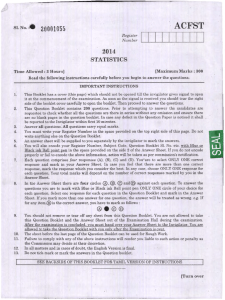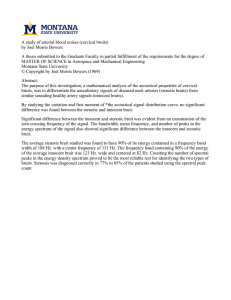from pets to humans
advertisement
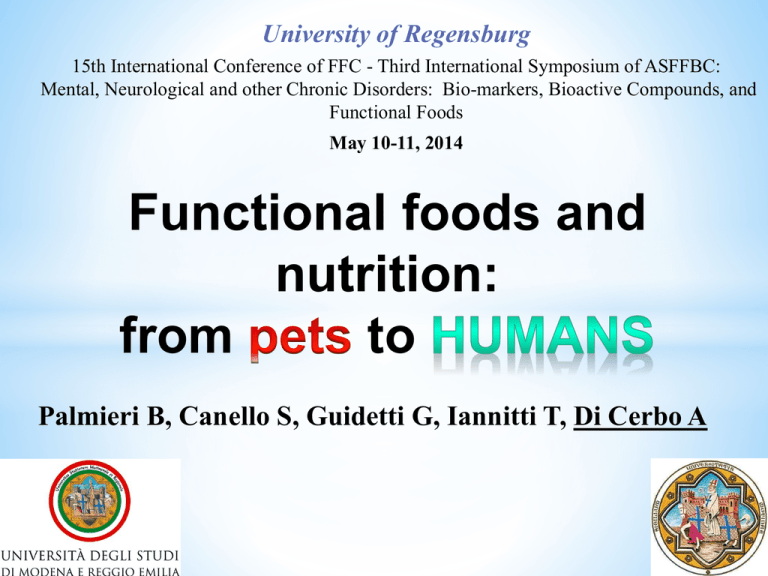
University of Regensburg 15th International Conference of FFC - Third International Symposium of ASFFBC: Mental, Neurological and other Chronic Disorders: Bio-markers, Bioactive Compounds, and Functional Foods May 10-11, 2014 Functional foods and nutrition: from to Palmieri B, Canello S, Guidetti G, Iannitti T, Di Cerbo A “…provide health benefits beyond the provision of essential nutrients, such as vitamins and minerals, if consumed regularly at effective levels and as part of a varied diet...” (Hasler, 2000) STUDIES Almost 10 years ago… genomic proteomic Network of Human and Vet comparative: oncology, inflammation and neurodegeneration physiopathology, health maintenance, nutrition prevention and treatment Focus on oncology with pet animals as sentinels of human diseases and potentital recognition of health imbalances especially in old seek people To match animals vs humans on a common pathophysiological and therapeutical basis and furthermore to comparatively explore the human/pet common background for more effective strategies in human health and disease WELL BALANCED OMEGA 3/OMEGA 6 RATIO METALS AND POLLUTANTS FUNCTIONAL FOOD FORMULA VEGETAL AND FRUIT EXTRACTS, MICRONUTRIENTS, ATIOXIDANTS, ETC… PROBIOTICS AND PREBIOTICS WORK HYPOTHESIS OF OUR INVESTIGATION Might any of these formulas be routinely used in prevention and early disease treatment for humans and animals? 1st STUDY Seventy-one dogs of different breeds (mean age ± SEM; 6.01 ± 0.11 yr and mean weight ± SEM; 35.04 ± 1.04 Kg; 54% males, 46% females) with food related dermatitis symptoms (flush, itch, dandruff, skin malodour, dry fur, skin lesions) were supplied with a regular amount of nutraceutical product (a standardized mixture of fish, potato and natural compounds such as: Aloe Vera, Arctium lappa, Malva sylvestris and Ribes nigrum) named FORZA10 Dermo Active over a 20 days period BEFORE AFTER 20 0 2 E 3 TI M *** 10 DRY FUR TI M E TI M E 20 10 0 2 E ITCH TI M 1 0 1 E 2 Mean Intesity Index *** TI M 20 *** 0 ** Mean Intesity Index TI M E 10 3 TI M E 20 3 E 0 2 TI M E *** TI M *** 10 SKIN MALODOUR E 0 TI M 1 0 Mean Intesity Index 1 E 20 10 2 TI M E E 0 *** 0 *** Mean Intesity Index TI M TI M TI M E Mean Intesity Index 3 TI M E 20 3 TI M E 10 0 2 TI M E TI M E Mean Intesity Index FLUSH DANDRUFF 3 *** *** 1 0 SKIN LESIONS *** *** 1 0 ON THE HUMAN SIDE… Arctium lappa: Lappaol F, diarctigenin and arctigenin, found in the seeds or leaves, induce expression inhibition iNOS, NO production, pro-inflammatory cytokine expression suppression, NF-kB pathway inhibition, antioxidant enzymes, free radicals scavenging activation and apoptosis (Chan, 2011). EVIDENCE BEASED MEDICINE: N/D FOLK MEDICINE: Diuretic, diaphoretic and blood purifying agent Malva silvestris: phenolic acids such as: pyrogallol, Chrisin, Synergic, Gallic and Vanillic, tannins, saponins, resins, terpenes, flavonoids and carbohydrates have an antioxidant effect (malondialdehyde formation inhibition) (Sello, 2011) EVIDENCE BEASED MEDICINE: N/D FOLK MEDICINE: skin disorders, antimicrobial and anti-inflammatory Ribes nigrum: cassis polysaccharide (CAPS, polysaccharide-rich substance which consist of rhamnose, mannose, arabinose, galactose, xylose and glucose in a molar ratio of 11.3:0.9:54.1:29.8:2.0:1.9), with macrophage-stimulating activity. (Takata, 2005) EVIDENCE BEASED MEDICINE: N/D FOLK MEDICINE: antiinflammatory activity Tocopherols (vitamin E), ascorbic acid (vitamin C) and essential fatty acids (such omega-3 and omega-6) (Gasparetto, 2012), whose deficiency is known to be responsible for AD-like pruritic skin inflammation (Fujii, 2013) enhances the benefits of this functional food administration. EVIDENCE BEASED MEDICINE: N/D FOLK MEDICINE: skin diseases Aloe vera: anthrone, chromone, aloe verasin, and hydroxyaloin, antiinflammatory activity (Hu, 2003); immune stimulation by polyglucans, lectins (Aloctin 1) which significantly support the formation of specific and nonspecific antibodies (Boudreau and Beland, 2006, Akev 2007); Glucmannan and acemannan accelerate wound healing, activate macrophages, antineoplastic and antiviral effects (Zhang, 1996; Ramamoorthy, 1996) EVIDENCE BEASED MEDICINE: N/D FOLK MEDICINE: rejuvenating, healing, and soothing properties 2nd STUDY One hundred seven dogs of different breeds (mean age ± SEM; 6.03 ± 0.15 yr and mean weight ± SEM; 32.01 ± 1.17 Kg; 54.2% males, 45.8% females) with evident clinical chronic otitis symptoms received a regular amount of nutraceutical food (a standardized mixture of fish proteins, natural compounds such as: Melaleuca alternifolia, Echinacea purpurea, Tilia platyphyllos scapoli et cordata, Allium sativum L., Rosa canina L. and chelated Zinc and S. salivarius K12) named FORZA10 Oto Active over a 30 days period. EAR BEFORE EAR AFTER EARWAX ITCH *** *** 0.0 1.5 1.0 30 0.5 Ti m e 30 20 1.5 Ti m e 2.0 20 *** Ti m e 0.0 10 1.5 Ti m e 2.0 Ti m e 1.0 0 2.0 10 ** e Mean intesity index BLOOD PRESENCE Ti m e *** Ti m 30 20 * 0 1.5 Ti m e Ti m e 10 * Ti m e 0.0 *** Mean intesity index *** 30 EDEMA Ti m e 0.5 0.5 20 * 1.0 Ti m e * 10 *** 2.0 Ti m e 0.0 Ti m e 0.5 0 ** Ti m e *** Mean intesity index *** 0 *** Mean intesity index 30 20 Ti m e Ti m e 10 2.0 Ti m e 30 1.0 e 1.5 Ti m 2.0 20 10 Ti m e 0 1.0 e e 0 Ti m e Mean intesity index 1.5 Ti m Ti m Ti m e Mean intesity index PUS PRESENCE AURICULAR FLUSH *** *** *** *** 1.0 *** 0.5 0.0 *** *** *** *** 0.5 0.0 ON THE HUMAN SIDE… Clinical reports 8 children otitis media (OM) received 1 teaspoon of lemon-flavored cod liver oil (eicosapentaenoic acid and vitamin A) and 1 half-tablet of a chewable multivitamin-mineral tablet per day. A reduced antibiotic administration span than before supplementation was observed, suggesting a moderate preventive role for nutritional supplements for otitis media (Linday, 2002). 45 children with recurrent pathology received daily, for 90 days, an oral slow- release tablet containing 5 x 109 CFU of S. salivarius K12. A 6-month followup period defined a 40% reduction in the episodes of acute otitis media and a 65% of the incidence of ear infections (Di Pierro, 2012). Zinc supplementation can reduce both incidence of OM in healthy children under the age of five years and mean number of episodes (Gulani, 2012) 3rd STUDY Sixty dogs of different breeds (mean age ± SEM; 6.08 ± 0.14 yr and mean weight ± SEM; 32.05 ± 1.12 Kg; 55% males, 45% females) with clinical gastrointestinal disturbs (dehydration, appetite loss, regurgitation, emesis, abdominal pain, flatulence, borborygma, diarrhea, weight loss, stool consistency, blood and mucus presence in the stool) were supplied with a regular amount of nutraceutical product (fish proteic hydrolysates, corn and a standardized mixture of Enterococcus faecium DSM 10663-NCIMB 10415 (3.5 x 109 cfu), psyllium and natural compounds such as: Castanea sativa, Origanum vulgare spp. Hirtum, Bio mannan oligosaccharides (MOS), fructo-oligosaccharides (FOS), Rosa canina L. and electrolites) namely FORZA10 Intestinal Active over a 30 days period Ti m e 30 3 20 REGURGITATION e 0 Ti m Ti m Ti m e e e 30 20 10 0 3 Ti m 1 2 10 *** e 0 2 e *** m Mean disturb intensity GRASS WISH Ti m Ti 30 1 0 *** Mean disturb intensity e 20 *** e 30 Ti m e 10 *** m e Ti m e *** Ti Ti m 20 0 2 e 1 Ti m 3 Ti m 3 10 WEIGHT LOSS e *** 0 0 2 Ti m *** e Mean disturb intensity 1 Ti m 30 * 0 *** Mean disturb intensity e 20 *** e 30 Ti m e 10 0 *** m e Ti m e e *** Ti Ti m 20 3 e Ti m Ti m 3 Ti m 10 0 2 e e Mean disturb intensity 2 Ti m Ti m Mean disturb intensity DEHYDRATION APPETITE LOSS *** *** *** 1 0 EMESIS *** *** *** 1 0 30 2 e DIARRHEA *** *** *** *** *** 1 0 m m Ti Ti e 30 1 20 *** e 10 0 e 1 2 m * 0 *** Mean disturb intensity *** e 30 20 *** m e e 10 0 FLATULENCE Ti Ti Ti m Ti m e e 2 Ti m 3 20 10 Ti m m 3 e e 0 Ti *** Ti m Ti m e 0 Mean disturb intensity 1 m 30 *** Ti e 20 *** Mean disturb intensity Ti m e 3 Ti m 0 10 e e m 2 Ti m Ti Mean disturb intensity ABDOMINAL PAIN BORBORIGMA 3 *** *** *** ** * 0 ON THE HUMAN SIDE… Psyllium: in commonly used for the treatment of constipation (by increasing stool weight; Kumar, 1987), diarrhea (by increasing the bulk of stools; Belknap, 1997), inflammation bowel diseases-ulcerative colitis (alleviating chronic constipation in patients without slow colonic transit or disordered constipation; Fernandez-Banares, 1999), high cholesterol (binding of bile acids in the intestinal lumen and reduced risk of coronary heart disease; Van Rosendaal, 2004) and diabetes (Water-soluble dietary fibers decrease postprandial glucose concentrations and decrease serum cholesterol concentrations to men with type 2 diabetes; Anderson, 1999; Florholmen, 1982). Rosa canina: phytochemical compounds such as phenolic acids, proanthocyanidins, tannins, flavonoids, unsaturated and polyunsaturated fatty acids, phospholipids, minerals, galactolipids, and carotenoids relieve inflammatory symptoms and defers blood glucose and cholesterol elevation in HIV patients (Paydary, 2012) EVIDENCE BEASED MEDICINE: N/D FOLK MEDICINE: viral infections disorders of the kidneys and urinary tract and Origanum vulgare L. spp. Hirtum: polyphenols such as rosmarinic acid and flavonoids (quercetin, eriocitrin, luteolin-7-O-glucoside, apigenin-7-Oglucoside, luteolin, apigenin) a dose-dependent protective effect on the copperinduced LDL oxidation (Kulisić, 2007) EVIDENCE BEASED MEDICINE: N/D FOLK MEDICINE: disorders of the gastrointestinal tract, respiratory tract, and nervous system vegetables probiotics and prebiotics active principles fruits whole grains beverages What about Gut and ? The gut absorption is a complex pathway with intrinsic healing properties related to gut horomones and liver secretion haemodynamics and lymphodyinamics, microcirculation activity, gut cellular and soluble immune systems cytokines, microbiota neural network and neutroransmietters Gut microbiota: role in obesity Changes in gut microbial ecology • Reduction in Bacteroidetes and proportional increase in Firmicutes • Dramatic fall of overall diversity • Bloom of a single class of Firmicutes: the Mollicutes Alteration of metabolic potential • Enrichment for phosphotransferase systems • Enrichment for genes encoding beta-fructosidases Consequences • Increased capacity to import “Western-diet”-typical carbohydrates • Increased capacity to metabolize imported sugars Tilg H, Gatroenterology 2009 GUT microbiota and NASH NASH patients have a higher prevalence of small intestinal bacterial overgrowth which is associated with enhanced expression of TLR-4 and release of IL-8 Abu-Shanab et al., Nat Rev Gast Hep 2011 Beyond the direct effect of natural ingredients into the daily food intake the microbiota symbiontic function in human health and disease can be also modified by long term administration of functional food either in human or in animals TAKE HOME MESSAGES - Humanization of domestic animals can be a valuable strategy for dietary interventions studies - Based on clinical evidences humans and pets might have a very intriguing borderline mutual benefit in the functional foods area - The lesson of functional foods administration to the dog potentially might be addressed to human beings. Chronic food ingestion might infact modify the genetic background and prevent or treat many diseases - Possible gaps in human nutrition: the taste of functional foods might be a drawback to their prolongued intake; in fact the turnover of varied menus is utmost appealing for human nutrition - Gut microbiota modulation by probiotics/prebiotics administration may reduce the risk of disease WORKS IN PROGRESS HALITOSIS MANAGEMENT IN HUMANS AND DOGS BY MEANS OF A NUTRACEUTICAL INTERVENTION NUTRACEUTICAL APPROACH (Forza10 Immuno Active) IN DOGS AFFECTED BY KERATOCONJUNCTIVITIS SICCA BEFORE TREATMENT AFTER 30 DAYS

